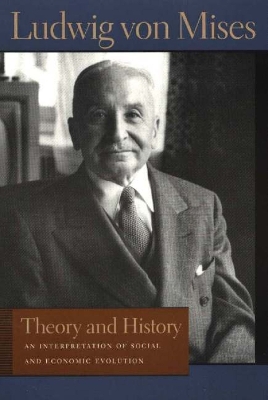Ludwig von Mises was the leading exponent of the Austrian School of economics throughout most of the twentieth century. He has long been regarded as a most knowledgeable and respected economist, even though his teachings were generally outside the 'mainstream'. THEORY AND HISTORY is primarily a critique of Karl Marx, his materialism, and his prediction of the inevitability of socialism. Marx attributes the creation of tools and machines, as well as the economic structure of society, to undefined 'material productive forces'; Mises rejects this materialistic view; he points out that tools and machines are actually created by individuals acting on the basis of non-materialistic ideas. This book discusses the theory of economics, i.e., the study of purposive human action, and with history, the record of the past actions of individuals. All actions are determined by ideas. Thoughts and ideas are 'real things', Mises writes. "Although intangible and immaterial, they are factors in bringing about changes in the realm, of tangible and material things." Rather than rejecting the study of historical change as a 'useless pastime', Mises considers it of the utmost practical importance. "History looks backward into the past, but the lesson it teaches concerns things to come." History opens the mind to an understanding of human nature, increases wisdom, and distinguishes civilized man from the barbarian. Moreover, historical knowledge is of the utmost importance in helping to anticipate and plan for the future. Though THEORY AND HISTORY may not be studied as often as other, more popular Mises works, it provides great insight into Mises's fundamental thoughts and is a fascinating exploration of human action.
- ISBN10 0865975698
- ISBN13 9780865975699
- Publish Date 1 August 2005 (first published December 1958)
- Publish Status Active
- Publish Country US
- Imprint Liberty Fund Inc
- Format Paperback
- Pages 275
- Language English
